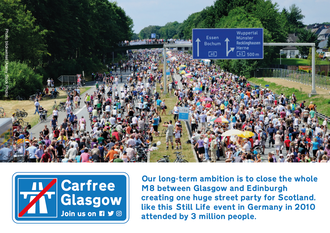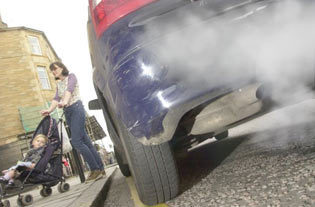-
Shut the M8 to traffic for a day and let us have a party!https://www.facebook.com/CarfreeGlasgow/videos/370608413272820/ Glasgow is the only city in the UK to have a six lane motorway cutting right through its heart. Yet, less than half of our households have access to cars. For the last 45 years we have all had to put up with a continual stream of traffic roaring through our city. Enough is enough. We want the chance to breathe fresh air and to hear ourselves think. We need the time and space to come together to start to imagine a more equal and sustainable future for our city. - Scotland has the worst health and lowest life expectancy in Europe. The physical inactivity encouraged by car use is more hazardous to health than smoking: http://www.bbc.co.uk/news/uk-wales-politics-18876880 - Glasgow has toxic levels of air pollution that breached World Health Organisation standards in 2016. Air pollution causes strokes, heart attacks and asthma and is responsible for over 300 deaths in our city every year: http://www.foe-scotland.org.uk/air-pollution - A quarter of our city's carbon emissions come from traffic, contributing to dangerous climate change. 2016 was the hottest year on record and the third of record-breaking heat in a row: http://www.theguardian.com/environment/2016/nov/14/2016-will-be-the-hottest-year-on-record-un-says We need bold and inspiring action to begin to address the crises caused by car use. We must radically re-think our cities so that everyone can get around easily and live healthy and happy lives without need or aspiration to own a car. Like many other cities around the world, Glasgow must also start dreaming of a time in the future when the outdated motorway infrastructure of the 20th century can be re-imagined and re-used in different ways. Our annual ‘carfree day’ will be the start. Paris (2015) - "Carfree day draws crowds to Champs-Élysées" http://ichef-1.bbci.co.uk/news/640/cpsprodpb/10BF/production/_85778240_85777672.jpg http://cdn.citylab.com/media/img/citylab/2016/04/champs_elysees-1/facebook.jpg http://www.bbc.co.uk/news/world-europe-34374125 Seoul (2005) - "City tears down an urban highway so it can breathe again" http://innerself.com/content/images/article_photos/x460/south_korea_restoration_project.jpg http://thewire.in/wp-content/uploads/2016/03/Korea-Seoul-Cheonggyecheon-2008-01.jpg http://grist.org/infrastructure/2011-04-04-seoul-korea-tears-down-an-urban-highway-life-goes-on Seoul (2016) - "City transforms ageing overpass into skygarden" http://www.mvrdv.nl/media/uploads/Web_07(1).jpg http://www.mvrdv.nl/media/uploads/Web_01.jpg http://www.mvrdv.nl/projects/seoul-skygarden London (1996) - "Reclaim the Streets party on M41 motorway" http://media.gettyimages.com/photos/crowd-of-protestors-reclaim-the-streets-mayday-london-uk-1997-picture-id558219803 http://digitaljournalist.eu/OnTheRoad/wp-content/blogs.dir/1/files/gallery-colour-reclaim-the-streets-rts/0428_10slide.jpg http://media.gettyimages.com/photos/reclaim-the-streets-camden-1990s-london-uk-picture-id558225853 http://www.urban75.org/photos/protest/m41report.html "Why Carfree Days Can Transport Us Towards A Brighter Future" http://www.huffingtonpost.co.uk/joe-irvin/why-carfree-days-can-tran_b_12099536.html http://www.huffingtonpost.com/anne-hidalgo/parisians-and-seoulites-w_b_12215902.html "Six Freeway Removals That Changed Their Cities Forever" http://gizmodo.com/6-freeway-removals-that-changed-their-cities-forever-1548314937 http://en.wikipedia.org/wiki/Freeway_removal Dallas (2012) - "Turning ugly overpasses into vibrant parks" http://i.kinja-img.com/gawker-media/image/upload/18zbxmsm9ul1cjpg.jpg http://gizmodo.com/five-cities-turning-ugly-overpasses-into-vibrant-parks-1259568561310 of 400 SignaturesCreated by Carfree Glasgow

-
GM food trial going ahead in U.K.Science has not yet proven that GM food do not have a health changing impact on fauna and the environment. Neither in the USA nor in UK or Europe are consumers interested in GM modified foods. Please urge this government to stop licensing GM modified foods until science can prove, that these food will have no impact on any living beings health. Perhaps we should encourage all world citizens to stop breeding like rabbits and take birth control. Than there will be no need to destroy nature for GM foods and agriculture. Perhaps we humans could learn something from Badgers10 of 100 SignaturesCreated by CJ Hummel
-
Save Salisbury's Wildflower MeadowThe building of a three-story GP surgery is being proposed to replace three of the four surgeries in Salisbury, with the favoured location situated south of Lime Kiln Way to the west of Odstock Road, grid reference SU145282. Just three years ago the proposed site was designated a County Wildlife Site, and it supports a large population of wildflowers, insects, and birds. This site is of great importance not just because of its beauty and the luxury of having a patch of natural meadow on Salisbury’s doorstep, but also due to the sad fact that in the last 70 years Britain has lost 97% of its wildflower population[1]. Even if you do not have a particularly strong feeling towards wildflowers, you must appreciate the sheer importance of having a site like this to support insects and the birds that depend on them. Other options for the site’s location include the now-empty Friends Provident buildings in Castle Street, and the agricultural field directly opposite the proposed site, to the east of Odstock road. In total there are 17 proposed sites, with Lime Kiln Way being preferred presumably because it is cheaper to build on as it is owned by the Council. This proposed site will inevitably lead to increased traffic at the already highly-congested Harnham interchange, which would in turn lead to difficulties getting ambulances to and from Salisbury District Hospital as residents would need to get buses or taxis to get there. Though we all understand the need for a new surgery in Salisbury, our argument is that the currently-favoured site is not suitable. As a local resident I have seen many oil beetles there (three of the UK’s native oil beetles are extinct, and the remaining five species are on the decline[2]), among the numerous species of wildflowers, and the Red Bartsia Bee is also a resident to the site. The land surrounding the site supports breeding birds such as the curlew, lapwing, snipe, redshank, and turtle doves. This is a small, precious refuge of natural green space that is incredibly rare to find in a city – especially one undergoing concentrated housing development like Salisbury. On behalf of my fellow residents in Harvard Heights and East Harnham (both areas share boundaries to the Lime Kiln Way site), I implore Salisbury City Council and local MP John Glen to look more closely into more suitable, alternative locations, and preserve the rare habitat that we can still enjoy in Salisbury. The Lime Kiln Way site offers a sanctuary for flora and fauna to thrive in an area left largely undisturbed by human activity, and future generations will be thankful for us having protected it. Thank you for taking the time to consider this petition. Gregory Nicholson References: [1] http://www.bbc.co.uk/earth/story/20150702-why-meadows-are-worth-saving also, http://www.wildlifetrusts.org/wildlife/habitats/lowland-meadows [2] https://www.buglife.org.uk/campaigns-and-our-work/oil-beetles2,168 of 3,000 SignaturesCreated by Gregory Nicholson
-
Scrap the Staffordshire Tipping TaxThe County Council has a legal duty to provide waste disposal free of charge for waste created in the household and through this delegated decision the Conservative leadership is ignoring its legal responsibility to the communities of Staffordshire. The Council should use its discretion to charge directed to business traders and identify these specifically to charge for waste generated from their commercial activities. These new charges have been hidden in County Council paperwork from two years ago and did not receive any meaningful public scrutiny. Further the Council took felt sufficiently concerned about their legal position that they obtained specific advice and concluded that “consultation….is not necessary.” The County Council has a duty to consider the impact of any decisions a cabinet member takes and of particular note is that they acknowledge that the charges will have a detrimental effect on the most vulnerable in our community stating clearly the “…greatest impact on low income households.” They have pressed ahead regardless with this discriminatory practice. Secondly, the Council acknowledge that there could be “a small increase” in fly-tipping. We think they have underestimated the increase in fly-tipping which is costly to clean up for the District Council. The Council think that people won’t be tempted to put soil, hardcore and plasterboard in their own bins. We think residents are likely to try and avoid these charges and this will mean less recycling. The Council do not care that they anticipate “some complaints” in the short term because they believe the issue will blow over and we, the residents of Staffordshire, will continue to accept their ill-considered and flawed decision making to the detriment of communities. All quotes from http://moderngov.staffordshire.gov.uk/documents/s87805/Review%20of%20Household%20Waste%20Recycling%20Centre%20non-household%20waste.pdf1,581 of 2,000 SignaturesCreated by Paul Woodhead
-
Ban disposable plastic in the UKFrance has recently committed to this cause and we should follow. We don't have time to wait, the planet and it's inhabitants l - including humans - are dying, drowning in plastic and we need to stop our own slow demise.1,133 of 2,000 SignaturesCreated by Michael Johnson
-
Ban BPA in our food packagingScientific evidence links our routine exposure to BPA to a range of diseases, including breast cancer. Scientific studies have found that an important route of exposure to BPA is via our food and drink. BPA leaches from the packaging and into the products, especially when they are scratched or heated during cooking and in the dishwasher. As diet continues to be our main route of exposure to BPA, lets call for it to be removed from all food and drinks packaging and replaced with safer alternatives.46 of 100 SignaturesCreated by Sam Whalen
-
On your bikeThere is Way to much traffic constantly polluting Brighton with fumes and the noise level is deafening all day and night.10 of 100 SignaturesCreated by Shirley Cripps
-
Protection from GM crops in our food chainGM crops are a monopoly. They are heavily contaminated with pesticides either as part of the genetic make up or as a result of pesticide sprays which cannot be washed off. They have an effect on pollinating bees, on the livestock that eat them eg soy for pigs and ultimately on human health either for the people that live in proximity to where the crops are sprayed and for the people that consume the animals fed on the crops or the produce itself. There is some evidence to suggest that the rise of gluten intolerance is due to pesticide residues and genetic alterations in wheat.5 of 100 SignaturesCreated by liz mcallister
-
Switch to paper cotton budsPlastic cotton bud stems are the number one item of plastic, sewage-related debris on our beaches and rivers [1] - yet retailers could help prevent this by switching the stick from plastic to paper. In the marine environment, plastics can be eaten by marine life, often with fatal consequences. Plastic is found in the stomachs of Loggerhead Turtles, Seabirds and many species of UK-caught fish. And pieces that don't get eaten break down into microplastics, forming part of a dangerous plastic smog in our seas. Retailers are listening - earlier this year, Waitrose and Johnson & Johnson announced they'd make the change to paper, and the Coop and Marks and Spencers sell paper-stem buds. Now we need to make sure the others do the same. Tesco, Sainsburys, Boots, ASDA, Morrisons, Lidl, Aldi, Superdrug and Wilko are currently reviewing their policies on cotton buds ... which is why we need to show them how many of us support the switch to paper! Even paper stem cotton buds shouldn’t be flushed down the loo. But if they are, they're less likely to pass through sewage filters and will quickly biodegrade if they escape. So please sign and share our petition to ask the remaining retailers to Switch the Stick from plastic to paper. Your voice will be heard! Thanks, Natalie and the City to Sea Team [1] Beachwatch Report 2015, Marine Conservation Society158,978 of 200,000 SignaturesCreated by Natalie Fée

-
Save C.S. Lewis Nature ReserveUPDATE - January 2020: The planning application has been withdrawn!!! We do not have all the details yet as to why this has been withdrawn. UPDATE May 2019: we are still waiting for this application to be discussed at the East Oxford Area Planning Committee meeting, this campaign is still alive! We need as much support as we can muster to attend that meeting. We will find out a week before the meeting if it is on the agenda and I will notify supporters by email; hopefully, lots of people can make it to the public meeting to demonstrate our disapproval in person! Lets not give up the fight! A planning application has been submitted for a new build development that would provide 9 apartments (in a mix of 1, 2 and 3 beds) in a 21⁄2 storey building and 22 parking spaces. The proposed plan would also require an access road to be built at the end of Lewis close and along the boundary of the C.S Lewis Nature Reserve run by the Berkshire, Buckinghamshire and Oxfordshire Wildlife Trust. I spent my childhood playing in the C.S Lewis reserve and now bring my own children there to explore the wonders it holds. It truly is a magical place and C.S. Lewis based his writings about Narnia on it, although back then it was his back garden! The reserve comprises mature woodland slopes and two ponds. The larger pond is noted for spawning toads and giant horsetail surrounding it. The nature reserve and surrounding area currently supports birds, reptiles, badgers and roosting bats among other wildlife. The area is also suitable for protected species such as Great Crested Newts which have been spotted in the area. The proposed development and access road will create noise, light, dust pollution and many more negative impacts on the environment and wildlife. A preliminary ecological appraisal has been undertaken and although does cover some of the impacts on the potential wildlife others have been omitted. The report does make some suggestions to mitigate the impact such as a protective, closed fencing around the development area, a review of the design to ensure no light spill or disturbance post development, undertaking work outside the main bird nesting season etc. However I strongly feel that despite these measures to mitigate the impact the development will still have a detrimental effect the area and wildlife. One persons objection on the oxford city council planning webpage for this development also points out that a close solid fence could actually compound the danger to the animals. Lewis close leading up to the reserve is peaceful and quiet and safe for the many children that use it to access the reserve. It is such a wonderful place and the access road and property development that is planned to run along it will no doubt pollute the lake, increase the traffic making it unsafe for pedestrians and spoil this place of amazing magic and beauty. This area is of national and historical significance and should be preserved for generations to come. The nature reserve and the adjacent Lewis Close is peaceful and quiet. Many residents and visitors go there for the peace, tranquility and the inspiration it offers. The nature reserve and the house that C.S. Lewis lived in is of huge literary and historical importance and would be spoiled by this development. I felt strongly that this development should not go ahead and decided to start this 38 degrees campaign. Please help me to stop this development from happening so future generations can continue to be inspired by its wildlife and wonder.6,002 of 7,000 SignaturesCreated by Cara Langford
-
Monitor kerbside air-quality on roads close to schoolsRecent research has established direct links between traffic derived air-pollution and impact on human health. Nobody benefits when the only air for breathing contains sooty particles -but young children are especially vulnerable. Its a fact that impaired lung-development, respiratory disease and reduced life expectancy are all a consequence of regular exposure to traffic fumes. Now its time to acurately measure just what is in the air around Welsh schools.79 of 100 SignaturesCreated by John Butler
-
Reduce City Pavement PolutionIt horrifies me to see diesel fumes being discharged into the faces of our youngest children in their buggies or toddlers walking with their parents, let alone at pavement level for adults to breath. If they were directed upwards to the highest level of the vehicle, it could make a significant improvement. It would not be difficult to extend the exhaust pipes of vehicles up the back of the vehicle; The older the vehicle, the more important to make this modification.1 of 100 SignaturesCreated by Roger Martin
Hello! We use cookies to improve your experience by providing insights into how the site is being used. Find out more.








.jpg)



